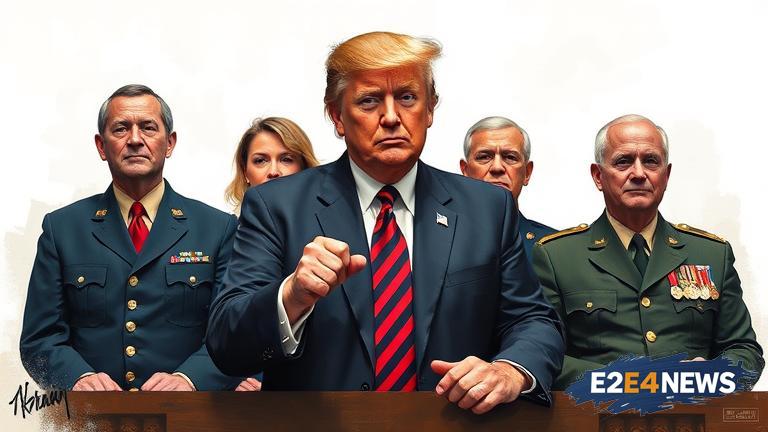The Trump administration’s vetting process for top general nominees has come under scrutiny, with some experts suggesting that it may be used as a loyalty test. The process, which involves a thorough background check and evaluation of a nominee’s qualifications and experience, has been criticized for being overly politicized. The administration’s approach to vetting has raised concerns that it may be prioritizing loyalty to the president over other factors, such as a nominee’s qualifications and experience. This has sparked debate among military and political experts, with some arguing that the process is necessary to ensure that nominees are aligned with the administration’s goals and values. Others, however, have expressed concerns that the process may be used to weed out nominees who are not seen as sufficiently loyal to the president. The vetting process has also been criticized for being overly secretive, with some nominees reportedly being asked to provide detailed information about their personal and professional lives. The administration has defended its approach to vetting, arguing that it is necessary to ensure that nominees are qualified and capable of leading the military effectively. Despite these assurances, concerns about the vetting process remain, with some experts suggesting that it may be having a chilling effect on the willingness of qualified nominees to come forward. The debate over the vetting process has also highlighted the complex and often fraught relationship between the military and the political establishment. The military has long been seen as a non-partisan institution, with generals and other senior officers expected to remain neutral and avoid taking public stances on political issues. However, the Trump administration’s approach to vetting has raised concerns that this tradition of non-partisanship may be under threat. Some experts have suggested that the administration’s emphasis on loyalty may be leading to a culture of fear and intimidation within the military, with officers feeling pressured to conform to the administration’s views or risk being passed over for promotion. Others have argued that the vetting process is necessary to ensure that nominees are committed to the administration’s goals and values, and that it is not necessarily a loyalty test. The issue has also sparked a wider debate about the role of the military in American society, with some experts arguing that the institution should be more transparent and accountable to the public. The vetting process has also raised concerns about the potential for politicization of the military, with some experts suggesting that the administration’s approach may be undermining the institution’s credibility and effectiveness. Despite these concerns, the administration has continued to defend its approach to vetting, arguing that it is necessary to ensure that nominees are qualified and capable of leading the military effectively. The issue is likely to continue to be a source of controversy and debate in the coming months, with some experts suggesting that it may have significant implications for the future of the military and its relationship with the political establishment. The Trump administration’s approach to vetting has also been compared to that of other administrations, with some experts arguing that it is more politicized and partisan than in the past. The issue has also sparked a wider debate about the role of loyalty and partisanship in the military, with some experts arguing that the institution should be more focused on serving the nation than on serving a particular political ideology. The vetting process has also raised concerns about the potential for abuse of power, with some experts suggesting that the administration may be using the process to punish or reward nominees based on their perceived loyalty. The issue is likely to continue to be a source of controversy and debate in the coming months, with some experts suggesting that it may have significant implications for the future of the military and its relationship with the political establishment. The Trump administration’s approach to vetting has also been criticized for being overly focused on personal loyalty to the president, rather than on a nominee’s qualifications and experience. This has raised concerns that the process may be undermining the institution’s credibility and effectiveness, and that it may be leading to a culture of fear and intimidation within the military. The issue has also sparked a wider debate about the role of the military in American society, with some experts arguing that the institution should be more transparent and accountable to the public. The vetting process has also raised concerns about the potential for politicization of the military, with some experts suggesting that the administration’s approach may be undermining the institution’s credibility and effectiveness. The Trump administration’s approach to vetting has also been compared to that of other administrations, with some experts arguing that it is more politicized and partisan than in the past. The issue has also sparked a wider debate about the role of loyalty and partisanship in the military, with some experts arguing that the institution should be more focused on serving the nation than on serving a particular political ideology.
